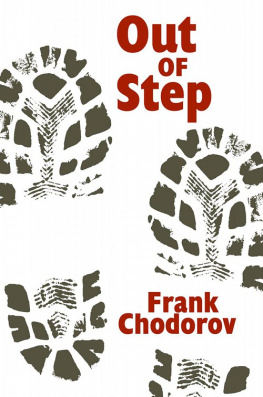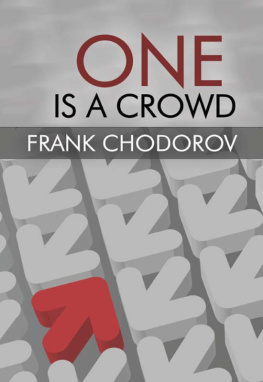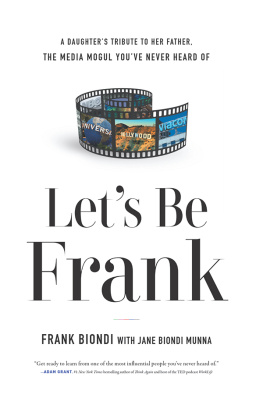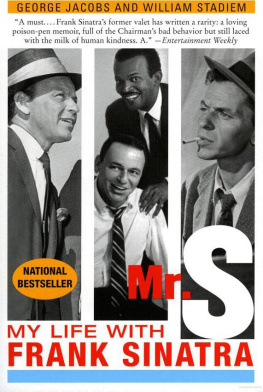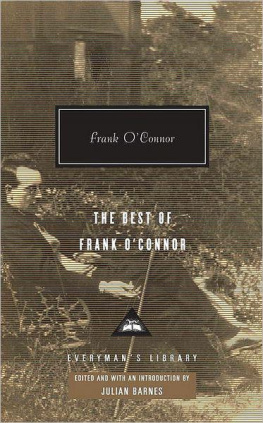OTHER BOOKS BY FRANK CHODOROV
One Is a Crowd
The Income Tax: Root of All Evil
The Rise and Fall of Society
Out of Step
The Autobiography of an Individualist
By FRANK CHODOROV
With Introduction
by E. Victor Milione
THE DEVIN-ADAIR COMPANY
New York, 1962

Copyright 1962 by The Devin-Adair Company
All rights reserved. Permission to reproduce material from this book should be obtained in writing from the publisher, The Devin-Adair Co. 23 East 26th Street, New York 10 except by a reviewer, who may quote brief passages in connections with a review.
Canadian Agent: Thomas Nelson & Sons, Ltd., Toronto
Library of Congress Catalog card number: 6213461
Printed in the United States of America
to CELIA
Introduction
IN THE NEXT to the last chapter of this book, Frank Chodorov asks, what in life is more worthwhile than the pursuit of an ideal? We may confidently predict that were he to be asked this question he would reply, nothing.
We could predict his reply because his life has answered the question for us. His whole life has been spent in pursuit of the ideal of individual liberty. And, he has been Out of Step because most people of the current age have been pursuing unearned ease, comfort, security and everything else but individual liberty.
I first met Frank when I was a junior in college. His concern then, as now, was with individual liberty and the threat to it, in potential or fact, from too much government. Because of this mutual concern we became close friends and finally associates in the Intercollegiate Society of Individualiststhe organization he founded in 1952 to counteract collectivism on the campus.
Although we are both individualists, we are not always in complete agreement. For instance, I do not believe that all governmental ideas should be consigned to the junk heap. Nor do I agree with Franks dictum, socialists (individualists) are born not made.
I am not prepared to dismiss the influence of Dewey, Samuelson et al, so lightly. However, in an age such as ours with its excess in the direction of totalitarianism, thank God for an individual such as Frank.
A book reviewer once described Frank as one who has just been around. That he has. He has explored the intellectual vineyards of modern-day collectivism and found its fruits as unpleasant and poisonous as were those of the collectivisms of previous generations. A man of firm principles, individualist incarnate, Frank Chodorov has contributed greatly toward the cause of libertarianism, freedomand, perhaps, civilization.
E. Victor Milione
CHAPTER I
The Ethic of the Peddler Class
I WAS BORN on the lower East Side of New York and brought up on the lower West Side. (I bring in these facts as introduction to some ideas that may be of general interest, not as autobiography.) Of my earliest experiences I remember practically nothing. But, one incident does come to mind. My father, an immigrant who, like many others, took to peddling as a means of making a living, brought me a toy of some sort from one of his trips; maybe the fact that this was the only toy I ever had, if memory serves me right, made an indelible impression on me. In those days, and under the circumstances, a toy was a rarity in the life of a youngster.
As a vocation, peddling has long since gone out of style in this country, and the image of the peddler that has remained is not a glamorous one. Yet, the peddler must be given credit for helping to build the great American economy. He began his enterprise by bringing to the hinterland a modest pack on his back, as much as he had capital for, selling the contents and returning to his distributing point as soon as possible. He lived frugally, saved much of the proceeds of his sales, and invested his savings in a larger pack. He continued this process until he had saved enough to buy a horse and wagon, which enabled him to go more deeply into the sparsely settled areas and distribute more merchandise. After a few of these trips he found a burgeoning community that gave promise of supporting a permanent or resident peddler, that is, a merchant. He built a shack in this town and filled it up with things folks wanted, and made his residence in the back of the store. In due time, he brought a wife to help him with the chores and to share with him his meager quarters. As the town grew so did his store. He built another room to hold more wares, and then an upper storey, meanwhile moving his wife and children to a more commodious house. And when he died he left his heirs a department store.
This is the story of most of the department stores, the merchandise marts, that dot the American landscape today; they began with a pack on some peddlers back. Indeed, it is the story in broad outline of many of the industries that make up the American economy, from steel to automobile; some pioneer, beginning in a small way, exercised industry and thrift and plowed back his savings into his business to serve the needs of the community. He might have, as conditions warranted, borrowed the savings of others to expand his enterprise, but until he had demonstrated his ability to render service, and the need for it, his capital consisted mainly of his own savings. That practice has gone by the boards these days for one reason: the income tax absorbs the savings of the entrepreneur before he can lay his hands on it. The tax-collector gets the accumulations that might have been plowed back into the business, and growth from modest beginnings is therefore impossible. This has the tendency to discourage enterprise, to freeze the proletarian into his class regardless of his ambition or ability. The imaginative entrepreneur of today must begin on a relatively large scale, by borrowing from the government against a government contract or some enterprise undertaken on a government grant or guarantee. The little man must remain little.
Now, the peddler, using the term figuratively, was the backbone of the American economic and social system. He was the middle class man who prided himself on his initiative, self-reliance, independence and, above all, his integrity. He might be shrewd and even grasping, but he never asked for favors and certainly did not expect society to take care of him. In fact, if he thought of society at all, he thought of it as a collection of individuals, like himself, each of whom contributed to it, and that without them society simply did not exist. To keep his standing in the society of which he was an integral part, he paid his debts and taxes regularly, went to church as a matter of course, voted as his conscience dictated, contributed to local charities and took part in civic affairs. To be good a society had to consist of good men, and therefore the ethos of his community was his own. He was society.
And he was middle class. But, the term, in the context of the early part of the century, carried certain connotations that have been lost. In popular usage the term middle class designates those whose incomes provide them with more than the mere necessities, who enjoy some of the luxuries, who have saved up something for future contingencies, and who are neither rich nor poor. That is, we think of the middle class in terms of income. In that context, we might include in the present middle class many who in former times would have been classified as proletarian; for the income of many who work for wages today is sufficient to provide them with satisfactions that would have been luxuries to the old middle class. The merchant or the banker of that era did not dream of an automobile or of a Florida vacation, nor did he enjoy any of the home conveniences that are now considered necessities by most of those who have nothing to sell but their labor. Thus, in economic terms, the middle class is much larger and much more affluent than it was in the past.
Next page
